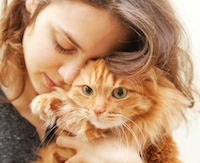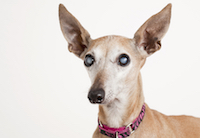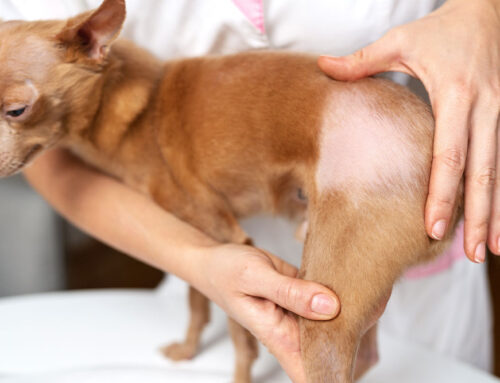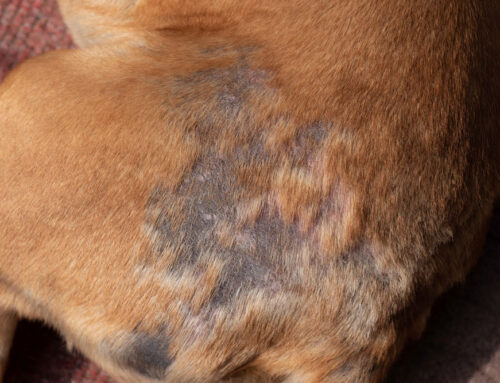Pet Times |
Nov 2015 |
In this issue we:
|
Tidmore Veterinary Hospital 2914 Lurleen B. Wallace Blvd Northport, AL 35476 (205) 339-5555 |
Have You Cuddled Your Cat Today?
The idea that petting a dog or cat reduces stress levels in people is not news. However, a study in Preventive Veterinary Medicine just showed that this process also works the other way – physical contact with cats also helps reduce their stress levels!
The study took 96 content and healthy shelter cats, and divided them into 2 groups. One group received no extra attention, while cats in the other group got positive attention from a person 4 times per day, for 10 minutes at a time, for 10 days. At the end of 10 days, the “gentled” cats were, indeed, gentler and appeared more content, and they were also healthier – the incidence of upper respiratory infections was much lower (9 of 47 compared to 17 of 49).
So, please, for your kitty’s sake, spend a little extra time cuddling your cat! It’ll do you both some good!
|
Find us on
|
In Case of
Emergency |
It’s Pet Cancer and Pet Diabetes Awareness Month
Various forms of cancer, as well as diabetes, are particularly common among our older pets.
Like almost all other conditions, early detection leads to a much better long-term prognosis, so being aware of the signs is critical for your pet (this is also why we like to see our older pets more often than once per year).
Diabetes involves a decreased production of insulin, which is necessary for muscle and other tissues to get the glucose they need for fuel. Without it, blood sugar levels rise, but these tissues are still starving. The high blood sugar leads to sugar in the urine, and that sugar pulls a large amount of water to it (remember osmosis from high school chemistry – the movement of water from a greater concentration to a lesser concentration across a semi-permeable membrane?).
These two factors explain the early signs of diabetes:
- Weight loss, in spite of a ravenous appetite
- Increasing urine volumes (cats will fill the litterbox, dogs will go outside more often, or may start urinating in the house)
- Increasing water consumption (you may need to fill the bowls more frequently)
- Constipation – remember, diabetics are drinking a lot because they are urinating a lot, and frequently cannot catch up. This leads to chronic dehydration, which can cause constipation
Cancer, on the other hand, doesn’t always have such clear-cut signs. If you find any lumps or bumps on your pet, please bring them in so that we can check them out for you. Routine bloodwork and physical exams are critical to finding some of these quieter, more insidious processes, and finding them early increases the chances of treatment (while decreasing the financial impact).
Cancer treatment and research is one of the fastest-evolving facets of veterinary (and human) medicine, and we have a lot more treatment choices now than we did even 5 years ago, but early detection is still the key to success. If you have any question at all about your pets, it is definitely best to bring them in, that’s why we are here!
Thank You!
During this month of Thanksgiving, we all have people in our lives for whom we are (or should be) thankful. For us that certainly includes our staff, our clients, and our patients! It is a pleasure to work with our staff, build relationships with you, and get to know your pets and your families.
For many pets, access to table scraps (whether you feed them, or they steal from the counter) goes up, and this can lead to increased cases of gastoenteritis or pancreatitis. There tends to be more chocolate around (from now until Easter). Make sure last night’s Halloween haul stays out of reach!
Please remember that the holiday season can be stressful for pets. Some cats and dogs are really traumatized by the increased activity, and increased number of strange people in the house. Cats may become more reclusive and hide more, and dogs may do the same thing. Dogs may seem more nervous, and appetites might decrease. If this describes your dog in years past, please talk to us before the relatives come to visit – there are short-term medications to help with that anxiety!
With all those people coming and going, doors may be left open more often, and pets tend to get out during the holidays. Please make sure that your contact information is up to date with your microchip company, and keep collars and tags on your pets.
We will be open during regular hours on Wednesday, November 25, but we will be closed on Thursday, November 26, so that our staff can celebrate Thanksgiving with their families and friends. We will be back in the office on Friday morning, as usual.
From all of our family to yours, have a safe and happy Thanksgiving!








Leave A Comment